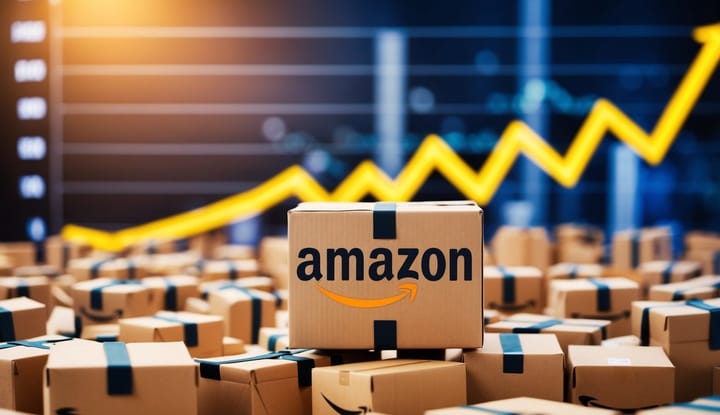How Long Does It Take to Start an Amazon FBA Business? Essential Insights & Tips

Starting an Amazon FBA business can be a rewarding venture for anyone looking to expand into ecommerce. This process involves setting up your Amazon Seller account, choosing the right products, and finding dependable suppliers. It typically takes around 1-2 weeks to begin seeing sales, with consistent effort leading to sustainable profits in about 2-4 months. Understanding each phase of the startup process and being prepared can make all the difference in your success.

Researching and planning are crucial in the early stages of your Amazon FBA journey. By carefully selecting products and strategically listing them, you can position yourself for a successful launch. The competitive nature of selling on Amazon requires staying informed and adaptable, ensuring your business can grow and thrive.
By investing time in marketing and brand awareness, new sellers can differentiate themselves in a crowded marketplace. Effective management of operations and growth not only builds credibility but can also foster continued success. Each step you take towards building your Amazon FBA business is a step toward potential profit and growth.
Key Takeaways
- Sales often start within 1-2 weeks after product launch.
- Planning and product selection are critical early stages.
- Marketing and growth management are essential for success.
Laying the Foundation for Your Amazon FBA Business
Building an Amazon FBA business requires an understanding of current trends and careful financial planning. Essential steps include assessing the e-commerce landscape and creating a realistic business plan with financial projections.
Understanding Amazon FBA and E-Commerce Trends
Amazon FBA allows sellers to leverage Amazon’s logistics network. This simplifies operations as Amazon manages storage, packing, and shipping. E-commerce is growing rapidly, offering vast opportunities for new and existing sellers. Tracking industry changes is critical.
Staying informed about consumer preferences and Amazon policies can help tailor strategies. Emerging trends, such as eco-friendly products or tech gadgets, might represent lucrative niches. Analyzing successful categories and learning from top sellers benefits emerging entrepreneurs.
Creating a Business Plan and Financial Projections
A well-crafted business plan sets clear goals and strategies. Determining target markets, product niches, and marketing approaches is crucial. A clear budget, considering product costs, shipping, and marketing, provides a financial roadmap.
Developing financial projections involves predicting revenue and expenses. This includes startup costs, monthly fees, and possible returns. Long-term planning should consider the potential growth and scalability of the business. Regularly reviewing and adjusting projections based on sales performance can enhance success.
Setting Up Your Amazon Seller Account
Starting an Amazon FBA business begins with creating a seller account, navigating Seller Central efficiently, and selecting the right products and categories. Proper setup ensures a smooth selling experience.
Registering and Navigating Amazon Seller Central
To create an Amazon seller account, begin by choosing a selling plan. There are two options: the Individual plan, which charges per item sold, or the Professional plan, which requires a monthly subscription fee. New sellers should consider the expected sales volume when making this choice.
Once the account is set up, logging into Amazon Seller Central is crucial. This hub serves as the command center for all selling activities. Users can manage inventory, track performance metrics, and conduct market research. Ensuring your contact details and business information are accurate helps avoid delays in setup processes.
Choosing the Right Products and Categories
Selecting the right products to sell can impact a seller’s success. It's important to research popular items and trends using tools like Amazon's Best Sellers list. Identifying a niche or category with less competition can also be beneficial.
Categories range from electronics to home goods, and some require special approval. Understanding your market and competition helps make informed decisions about which categories to focus on. Sellers should also consider the size and weight of products, as this can significantly affect shipping costs and logistics.
Product Research and Sourcing
Successful Amazon FBA ventures begin with thorough product research and effective sourcing strategies. Understanding market needs and building strong supplier relationships are crucial.
Conducting Comprehensive Market Research
In-depth market research is critical in identifying profitable products. Sellers should analyze current trends, customer preferences, and competition levels in various product categories.
Online tools and platforms can reveal metrics like search volume and price points. Google Trends and Amazon's own retail analytics are valuable for spotting potential opportunities. Comparing similar products helps gauge demand and possible pricing strategies.
Competitor analysis is vital for understanding what's working for top sellers. Look at product reviews to identify gaps or improvements. Cost analysis ensures the final product price remains competitive while providing a reasonable profit margin.
Cultivating Relationships with Suppliers and Wholesalers
Strong relationships with suppliers and wholesalers ensure smooth operations and quality control. Identifying reliable suppliers is key, and platforms like 1688 can help find manufacturers or distributors that meet your criteria.
Clear communication about product specs, pricing, and shipping terms is essential. Negotiating favorable terms, such as lower production costs or bulk purchase discounts, can enhance profitability. Establishing trust allows for better collaboration, which can lead to more flexibility during negotiations and transactions.
Regularly visiting trade shows can help discover new suppliers and trends. Trade shows offer valuable interaction opportunities, allowing for face-to-face negotiations and inspecting product quality directly.
Utilizing Product Research Tools and Software
Several software tools can assist in making informed product research and sourcing decisions.
Tools provide vital insights into product viability. Sellers can make educated choices on which products to pursue based on real-time data.
These tools also help track product performance over time, identifying trends that may require strategic adjustments. Using data from these tools, businesses can refine their approach, ensuring their product offerings remain competitive.
Utilizing research tools efficiently saves time and reduces risk, making them indispensable for Amazon FBA sellers.
Investing in Marketing and Brand Awareness

Effective marketing and building brand awareness are crucial for the success of an Amazon FBA business. Well-crafted product listings and strategic marketing help attract and retain customers. Using high-quality images, detailed descriptions, and SEO tactics boosts visibility.
Creating High-Quality Listings with Bullet Points and Images
Product listings need to be clear and appealing. Using high-quality images is essential as they provide potential buyers with a detailed view of the product. Images should highlight different aspects of the product, showing it from various angles.
Each product listing should include bullet points that succinctly describe the product's key features and benefits. Bullet points help potential buyers quickly grasp what the product offers. A well-written product description complements the bullet points, delivering more detailed information. A balanced combination of images and text can significantly enhance the buyer's experience and lead to increased sales.
Managing Your Operations and Growth

Effective management of inventory, understanding FBA fees, and delivering top-notch customer service are crucial for growing an Amazon FBA business. Each element plays a role in ensuring smooth operations and maximizing profitability.
Effectively Handling Inventory and Order Fulfillment
Managing inventory efficiently helps avoid stock-outs and overstocking. Sellers should monitor inventory levels using tools like Amazon's Seller Central. These tools provide insights into real-time stock updates and demand forecasts.
Shipping products to Amazon Fulfillment Centers is a key step in order fulfillment. Ensuring products are correctly labeled and packaged minimizes delays. Prime Shipping can benefit inventory management, as it reaches a wide customer base quickly.
Automating reorder alerts can streamline managing orders and ensure consistent stock levels.
Understanding FBA Fees and Calculating Profitability
FBA fees include fulfillment, storage, and shipping costs. Knowing these fees is crucial for profit calculation. Using Amazon's FBA Revenue Calculator can show potential costs associated with products.
Storage fees vary based on the time of year, with higher fees in peak seasons. Monitoring these costs helps maintain profitability. Additionally, offering FBA Export allows reaching international markets, impacting shipping costs.
Careful analysis of all these factors ensures that the business remains profitable.
Scaling Your Business with Customer Service Excellence
Exceptional customer service creates loyal Prime customers who repeat purchases. Providing prompt responses to inquiries and efficiently handling returns is essential. Sellers should use Amazon's messaging system to engage with customers professionally.
Implementing a streamlined process for feedback encourages positive reviews. This feedback loop helps improve product offerings and customer satisfaction. Announcing special promotions or discounts through customer emails can also drive sales.
By enhancing customer service strategies, sellers can effectively scale their business.
Frequently Asked Questions

Starting an Amazon FBA business involves several steps, each with its own timeframe. To succeed, it's important to understand how long key processes like account approval and setup take. Awareness of potential delays can also help in planning efficiently.
Q: What is the typical timeframe for Amazon FBA account approval?
Getting approval for an Amazon FBA account usually takes a few days. This period may vary depending on how quickly one submits required documents and any additional verification Amazon may need.
Q: What are the necessary steps to get started with Amazon FBA and their average duration?
To start, a seller must create an Amazon seller account, choose a fulfillment strategy, and list products. Each step can take a few days to a few weeks. Account setup, product research, and creating listings are crucial parts of this process.
Q: How much time should a new seller allot for the initial setup of an Amazon FBA business?
The initial setup often takes a couple of weeks. This includes researching products, setting up the seller account, and preparing the first shipment to Amazon. New sellers should plan for a thorough preparation phase.
Q: After setting up an Amazon FBA account, how quickly can one begin selling products?
Sellers often begin selling within 1 to 2 weeks after their product listings are live. The timeline can differ based on product approval and shipping arrangements to Amazon fulfillment centers.
Q: What factors can affect the verification process time for an Amazon business account?
Verification times can vary due to incomplete documentation or high demand for account approvals. Ensuring all necessary details and proofs are submitted correctly can help prevent delays.
Q: Can the process of starting an Amazon FBA business be expedited, and if so, how?
To expedite the process, sellers should gather all required documents in advance and ensure their applications are complete. Prompt responses to any queries from Amazon can also speed up account verification and approvals.
Wondering how long it takes to start your Amazon FBA business? Join our FREE WAH Academy Training Group to get helpful tips and insights on how to launch faster and smarter!
No cost, just expert advice—click below to get started!



